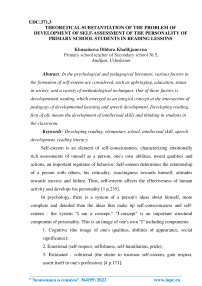Theoretical substantiation of the problem of development of self-assessment of the personality of primary school students in reading lessons
Автор: Khusainova D.Kh.
Журнал: Экономика и социум @ekonomika-socium
Рубрика: Основной раздел
Статья в выпуске: 4-2 (95), 2022 года.
Бесплатный доступ
In the psychological and pedagogical literature, various factors in the formation of self-esteem are considered, such as upbringing, education, status in society, and a variety of methodological techniques. One of these factors is developmental reading, which emerged as an integral concept at the intersection of pedagogy of developmental learning and speech development. Developing reading, first of all, means the development of intellectual skills and thinking in students in the classroom.
Developing reading, elementary school, intellectual skill, speech development, reading literacy
Короткий адрес: https://sciup.org/140291626
IDR: 140291626 | УДК: 371.3
Текст научной статьи Theoretical substantiation of the problem of development of self-assessment of the personality of primary school students in reading lessons
Self-esteem is an element of self-consciousness, characterizing emotionally rich assessments of oneself as a person, one's own abilities, moral qualities and actions, an important regulator of behavior. Self-esteem determines the relationship of a person with others, his criticality, exactingness towards himself, attitudes towards success and failure. Thus, self-esteem affects the effectiveness of human activity and develops his personality [1 p.235].
In psychology, there is a system of a person's ideas about himself, more complete and detailed than the ideas that make up self-consciousness and selfesteem - the system "I am a concept." "I-concept" is an important structural component of personality. This is an image of one's own "I" including components:
-
1. Cognitive (the image of one's qualities, abilities of appearance, social significance);
-
2. Emotional (self-respect, selfishness, self-humiliation, pride);
-
3. Estimated - volitional (the desire to increase self-esteem, gain respect, assert itself in one's profession) [4 p.171].
Based on the judgments of the teacher, parents and comrades, the younger student evaluates himself - in relation to everything that is connected with the school. This does not mean that his assessments are correct - often the opposite is true. Self-assessment speaks more about the desires of the child than about the actual state of affairs.
At school, the child meets with a clear and detailed system of moral requirements. The elders make sure that these requirements are observed and assimilated by children - this is the way to form their social orientation of the personality. With the age of the student in the educational process, an attitude is formed to assess their capabilities - one of the main components of self-esteem. M.I. Dyachenko believes: “Self-esteem reveals a person’s evaluative attitude to himself, to his character, appearance, speech” [4 p. 364].
Self-esteem reflects what the child learns about himself from others, and his increasing own activity, aimed at understanding his actions and personal qualities. A child's self-esteem is found not only in how he evaluates himself, but also in how he relates to the achievements of others. Throughout schooling, already in the primary grades, the meaning of the mark for the child changes significantly; at the same time, it is in direct connection with the motives of learning, the requirements that the student himself makes. The attitude of the child to the assessment of his achievements is more and more associated with the need to have, perhaps, a more reliable idea of himself.
The formation of the second, highest stage of self-esteem begins in adolescence and continues throughout a person's life as social experience accumulates and further mental development. The formation of a certain range of values in a child occurs not only at school. The child draws them from books, from conversations with his loved ones, from such sources of information as radio and television. Part of the assessments is transferred by the child to himself - these are assessments of behavior and personality traits.
The attitude of the child towards himself as a student is largely determined by family values. The child cultivates those qualities that parents care most about:
maintaining prestige, obedience, high academic performance. It has been noticed that the values of teaching in children and their parents completely coincide in the first grade and completely diverge by the fourth.
Inadequate self-esteem - (overestimated or underestimated) self-esteem deforms the inner world of the individual, distorts its motivational and emotional-volitional sphere and thereby prevents harmonious development. Self-esteem does not remain stable, depending on success in activities, age characteristics and many other factors, it tends to change. Sustained low self-esteem is extremely rare. All this suggests that the self-esteem of a younger student is dynamic and has a tendency to stability, gradually passes into the internal position of the individual, becomes a motive for behavior, and influences the formation of certain personality traits.
Inadequate low self-esteem in younger students is clearly manifested in their behavior and personality traits. A characteristic feature of children with low selfesteem is their tendency to withdraw into themselves, look for weaknesses in themselves, and focus their attention on them. The normal development of children with low self-esteem is hindered by their increased self-criticism and self-doubt. In all their undertakings, they expect only failure.
Список литературы Theoretical substantiation of the problem of development of self-assessment of the personality of primary school students in reading lessons
- Bezrukikh, M.M.Russian Pedagogical Encyclopedia. [Text]: / V.A. Bezrukikh, L.S. Glebov. 2002. - S. 232 - 236 p.
- Grigoryan, N.V. What is "developmental learning"? [Text] /N.V. Grigoryan // Primary school. - 1999. - No. 1. - S. 65 - 69.
- X. Alimova. Modern methods of using information technologies in lessons //Economy And Society. № 6(73) -S.: 2020. Qodirova G.T. The use of computers to improve the professional level of teaching and learning//Economy And Society. № 6(73) -S.: 2020.


